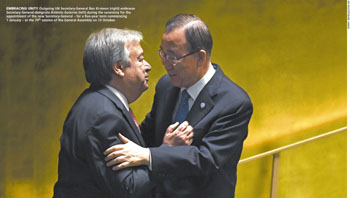UNITED NATIONS TRANSITION
IN THE UN’S HOT SEAT
Yasmin Helal reflects on the vexed issues that António Guterres will face upon taking office

It is possible that the unanimous decision by the United Nations (UN) Security Council to appoint António Guterres to the post of Secretary-General has come as a pleasant surprise to the world’s liberals, who time and again were faced with disappointment as conservative views gained momentum across Europe and the US.
Following the vote, it was decided that Guterres will replace Ban Ki-moon at the beginning of next year. The decision came early as the selection process was expected to last well into October.
Several politicians, particularly in Moscow, had also insisted on an East European being appointed to the post.
Nevertheless, Russia’s Permanent Representative to the UN Ambassador Vitaly Churkin had only good words for Guterres, saying: “He is a person who talks to everybody, listens to everybody, speaks his mind – a very outgoing, open person; so I think it was a great choice, and I’m glad that we rallied around Mr. Guterres.”
Meanwhile, other politicians were hoping for a female candidate to win the top job for the first time in the history of the UN. The 13 nominations for the post comprised seven women and six men, and included UNESCO Director-General Irina Bokova from Bulgaria and the Administrator of the United Nations Development Programme (UNDP) Helen Clark from New Zealand.
So Guterres’ victory was labelled by some as bittersweet – bitter because the next Secretary-General will once again be a man, and sweet as there are great expectations of him based on his profile and public statements.
As a result of public pressure from activists, the candidates had been participating in public hearings since April for the first time in the history of the UN. “This is a testament to the new open process,” said Natalie Samarasinghe, the Executive Director of the United Nations Association – UK and one of the founders of the 1 For 7 Billion movement.
She added: “When we looked at the candidates [who were] likely to prevail at the beginning of the race, he wasn’t a strong contender. He became one because of the open process.”
Having been the UN High Commissioner for Refugees for the past decade, much of Guterres’ talk has been about the refugee crisis in Europe, which has been exacerbated by the raging war in Syria as well as other parts of the Middle East.
“I am totally committed because of what I felt as head of UNHCR for 10 years,” he affirmed, during a debate between candidates.
On another occasion last year, Guterres asserted: “We can’t deter people fleeing for their lives. They will come. The choice we have is how well we manage their arrival, and how humanely.” The next UN Secretary-General’s stiffest challenge will be to propose new ways to handle the refugee crisis, especially after the UN’s failure to resolve conflicts in Syria and elsewhere.
During his time as the head of UNHCR, Guterres took significant steps towards improving the plight of refugees, including the reduction of the head-office-based staff in Geneva while increasing the capacity to deploy more cadres in the field. So far, public statements that he has made support a speedy resolution to the Syrian conflict and a humanitarian plan to deal with the refugee crisis.
In an interview with the BBC, Guterres was asked whether he feared worse bloodshed in Syria. “I hope not. I sincerely hope not because we have seen such a terrible level of suffering. To think that this will even get worse… I believe it is the international community’s first priority to be able to end this conflict, and use the momentum created by it to try to address all the other conflicts that are interlinked,” he replied.
The UN Secretary-General-elect added: “I hope people will understand that it’s better to put aside different opinions and different interests, and understand that there is a common [that is] vital interest to ending these conflicts – because that is absolutely central if you want to live in a world where a minimum of securities are established, where people can live a normal life.”
Guterres once famously said that “in the midst of migrants in search of a better life, there are people in need of protection; refugees and asylum seekers, women and children, and victims of trafficking… Many move simply to avoid dying of hunger. When leaving is not an option but a necessity,this is more than poverty.”
It is tempting to believe that he will make a difference as the current world order is falling apart with raging conflicts across the Middle East, an exacerbating refugee crisis and increasing terrorist attacks elsewhere.
With the diminishing influence and effectiveness of the UN, and the widespread belief that it is now an archaic organisation that has failed to evolve since its inception in 1945, how much he can change is left to be seen.
One of the key components of the role of the Secretary-General is to prevent international disputes from escalating.
But historically, the global institution has consistently failed to do so.
In addition to this, at certain times, the UN has had to consent to participate in violent interventions that only serve the economic and political interests of the world’s major powers, particularly the US.
With the UN being a fund-dependent organisation, it will be interesting to see to what degree António Guterres will be able to stand by his avowed promises and values.



